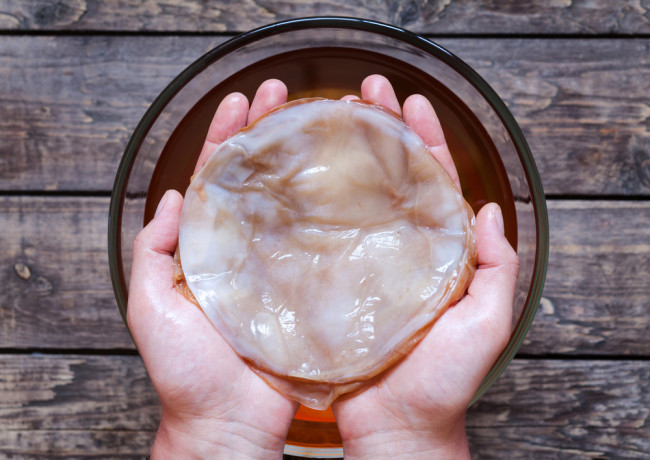We reside in attention-grabbing times. Wellness consciousness is in vogue, and so is distrust of mainstream medication. “Ancient” is normally understood to imply “effective.” So it is no shock that kombucha, a fermented tea that dates back some two,000 many years, is the wellness drink of preference for several.
Pronounced “kom-BOO-cha,” the drink is a fusion of sugar, bacteria, yeast and, at times, fruit. Several men and women love the tart, slight sweet style of kombucha and may possibly use it as a stand-in for soda or cocktails. But, unquestionably, kombucha’s level of popularity is also run by its purported wellness gains — rumors that can be traced to the fermented tea’s origins.
Proponents of kombucha say it supports digestion, rate of metabolism, immunity, liver function and a lot more. Staunch kombucha evangelists say it can combat a assortment of ailments, from hair decline to being overweight to diabetic issues — even cancer and AIDS. A bit of “booch,” as it is affectionately regarded, is also considered to rejuvenate, revitalize, reenergize and restore one’s body and thoughts.
But is kombucha a genuine wellness panacea, or just an additional wellness fad?
“Kombucha’s level of popularity implies men and women are interested in incorporating seemingly ‘healthy’ alternatives into their eating plan,” writes Julie Kapp, an epidemiologist at the University of Missouri, in an e-mail to Explore. “However, there is normally a hole, unbeknownst to the normal client, involving marketing and advertising and science.” Kapp co-authored a 2019 review of kombucha experiments that was published in the Annals of Epidemiology.
As with several other wellness tendencies, the jury’s still out on kombucha’s therapeutic potential. There merely has not been substantially analysis in people to assistance — or refute — the wellness promises built about the drink.
That reported, kombucha has caught the eye of experts, who are equally learning — and sipping — the beverage. Athena Aktipis, an evolutionary biologist at Arizona Point out University, became interested in the science of kombucha soon after developing an affinity for the beverage herself.
“I realized there was a massive hole in our comprehending of what kombucha is [and] how it worked,” she says. “If we do not even fully grasp that, how can we figure out what sort of gains it has for people, if it does, if we do not even fully grasp the essentials of how it works?”
The Heritage of Kombucha
Kombucha’s name as a miracle elixir is not a new development. Kombucha is considered to have originated in China all over 220 B.C., exactly where it was very first used as a general therapeutic and digestive support. Above the centuries, the “tea of immortality” little by little built its way all over the globe through trade routes.
In A.D. 414, a Korean medical doctor named Dr. Kombu reportedly introduced the fermented drink to the ailing Japanese Emperor Inkyo. According to legend, the emperor was so amazed with kombucha that he named it kombu-cha, or Kombu’s tea.
All around 1900 (but quite possibly before) Kombucha built its debut in Russia, exactly where it flourished as a selfmade beverage. In the sixties, a German doctor built unproven promises that his kombucha brew could combat cancer. All around the identical time, researchers in Switzerland reported that ingesting kombucha was as valuable as feeding on yogurt.
America’s very first style of kombucha likely arrived through the nineteen seventies, as the preliminary wave of the purely natural food stuff motion took root. But kombucha never quite discovered its location on the American desk through the processed-foods heyday of the ’80s and ’90s.
But times have modified. Microbiome analysis has revolutionized our comprehending of our wellness. Understandably, this has prompted men and women to search for approaches to hold their gut bacteria in fantastic condition. And several view kombucha as the solution.
What is in Kombucha?
Within each batch of kombucha is a numerous and cooperative ecosystem of microbes that operate with each other to make the beverage, Aktipis says. The system starts off by introducing a symbiotic colony of bacteria and yeast (also regarded as a SCOBY) into sweetened environmentally friendly or black tea. This concoction is still left to ferment somewhere involving a week and a thirty day period as quite a few chemical changes arise. Fundamentally, the yeast and bacteria operate on breaking down the sugars into liquor, and the liquor is then transformed into compounds like acetic acid, or the stuff that offers kombucha it is tang.

This is a SCOBY, exactly where the yeast and bacteria that make kombucha reside. (Credit history: GreenArt/Shutterstock.com)
The end final result is a beverage that is abundant in B nutritional vitamins, anti-oxidants and other compounds. But it is kombucha’s probiotics — or fantastic-for-you bacteria — that has piqued collective curiosity. And in this regard, kombucha may possibly have a leg up in excess of some other probiotic alternatives out there.
“When you are consuming any sort of probiotic, if you are having a one species that doesn’t have an ecological community, my guess is that there is not as several gains to that as consuming an ecological community of microbes [like all those in kombucha],” Aktipis says.
How the microbes from kombucha interact with the other a hundred trillion that by now reside in our digestive tract, if at all, remains a thriller. Researchers do not have evidence that microbes in kombucha actually colonize our guts. But, technically, the microbes do turn into a part of our microbiome until eventually they depart our bodies as squander, Aktipis says.
“When it arrives to consuming fermented foods, if they’re a frequent part of your eating plan, all those microbes invest a ton of time in your digestive tract exactly where they can be acquiring consequences, even if they aren’t permanently colonizing,” she adds.
Officially, the microbes in kombucha have not been confirmed to be probiotic, or valuable. And some gurus say the probiotics may possibly not be in a position to endure the acidic environment of the tummy.
It’s also essential to be aware that not all kombuchas are produced equal. That $4 bottle of kombucha may possibly have a unique microbial profile than the one particular sitting down following to it on retail outlet shelves. Some have juice or sugar added to them. And some producers pasteurize their kombucha to halt the fermentation system in buy to hold the liquor content very low — which may possibly cancel out some of the potential gains of ingesting kombucha, Kapp explains.
As kombucha has turn into a lot more mainstream, some large-scale brewers have gotten into lawful difficulty, with allegations ranging from falsely promoting probiotic content to not remaining as very low in sugar or liquor as claimed.
Research on Kombucha
Past analysis on kombucha has generally associated animals or cells in a dish — which normally do not translate to human wellness. Research on the wellness gains of fermented foods a lot more broadly do not provide substantially perception, possibly. Some experiments have discovered associations involving fermented food stuff use and enhanced wellness steps. But that doesn’t definitively demonstrate that fermented foods triggered the wellness reward.
In 2019, Kapp led a assessment of 310 experiments on kombucha and discovered just one that examined the tea’s consequences in people. In the review, 24 older people with variety two diabetic issues consumed kombucha for three months, which resulted in normal blood sugar ranges normalizing. But there were being some main limitations to the operate — not only was the review tiny, it didn’t involve a handle team.
Kapp says randomized, medical trials on men and women could help clear up some of the misinformation and confusion in excess of kombucha wellness promises.
“If kombucha has wellness gains, essential subsequent experiments will will need to deal with the next [inquiries]: At what dosage, frequency, and period? In what populations and subpopulations?” Kapp adds.
As kombucha’s level of popularity grows, likely so will curiosity in learning kombucha. Even if experts obtain that it doesn’t quite reside up to its name as a magical therapeutic elixir, we can still love kombucha for kombucha’s sake.
“When it replaces fewer-nutritious alternatives like sugary sodas, that by yourself is a wellness reward,” Kapp says.




